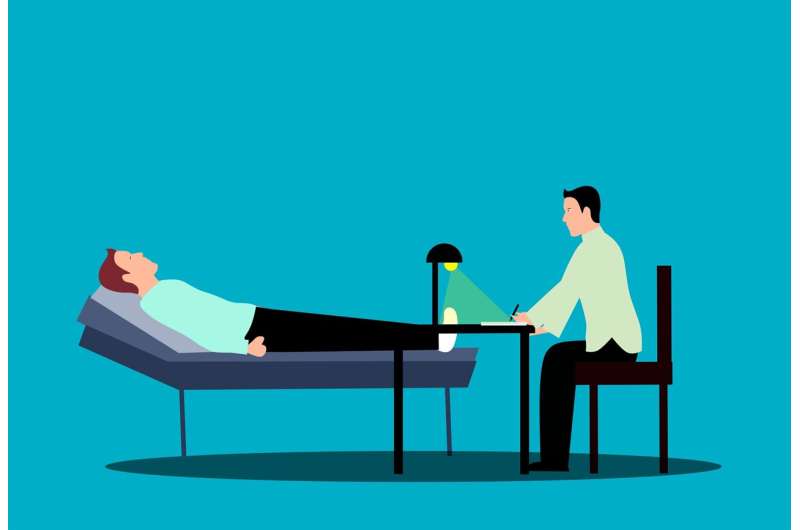This article has been reviewed according to Science X's editorial process and policies. Editors have highlighted the following attributes while ensuring the content's credibility:
fact-checked
trusted source
proofread
Surge in patients fuels burnout among mental health experts

Mental health practitioners are seeing an increasing number of patients since the pandemic, leading them to struggle with burnout and managing their own emotional health, according to the results of a new survey by Wiley, one of the world's largest publishers and a global leader in research and learning. As a result, some patients may not be receiving the amount of care they need.
Wiley's report, "The Psychology Practitioner: Navigating High Demand, Burnout, and Telemedicine," indicates mental health practitioners are experiencing greater demand for their services since the pandemic, with an increase in clients experiencing anxiety and depression. Overall, 73% of practitioners surveyed noted an increase in their number of clients since the pandemic, and 55% said they are seeing a rise in clients requiring medication.
Practitioners feel the increased demand is negatively impacting the amount of care received by patients. Most respondents say specific client populations are not getting the right amount of care and help they need, with nearly half (45%) indicating they are having to turn away patients or put them on a wait list.
The demands are also affecting practitioners' own emotional health. When asked about the top challenges they face, respondents name trying to achieve a good work/life balance (57%), working too many hours (44%), and feeling overwhelmed or burnt-out (40%), and more 4 four in 10 (42%) say clients are demanding more time than they have to give.
"Our data suggest the mental health crisis is real and worsening," said Amanda Miller, Wiley group vice president, Academic Publishing Group. "With limited time and resources to handle the rising caseload, these practitioners are being overburdened. We face an urgent need for more mental health professionals, and all practitioners will need access to high-caliber resources."
Practitioners expect situation will worsen
Practitioners don't foresee these problems ending anytime soon; in fact, they believe the situation will worsen. Most (83%) feel that the number of people seeking mental/emotional health services will increase five years from now.
"The repercussions of mental health practitioners experiencing increased workloads, burnout, and personal mental health challenges are profound," said Dr. Belynder Walia, psychotherapist and author of "Fix Me: How to Manage Anxiety and Take Control of Your Life."
"Therapists' burnout may lead to a reduced quality of care, longer wait times for patients and the potential for patients to experience worsening conditions during these delays, making their journey to recovery more challenging."
"Along with health care workers and teachers, mental health practitioners are increasingly and uniquely burdened with worldwide mental health problems and socio-political trauma," said John Sommers-Flannagan, author of "Clinical Interviewing and Counseling and Psychotherapy Theories in Context and Practice."
"Responding to the overwhelming mental health needs of others exacts a price on the mental health of mental health practitioners. More than ever before, mental health practitioners need support, resources, and recognition for their work."
Telemedicine, AI may help
The findings suggest practitioners are using technology as one tool to help alleviate the pressures they are facing. Almost all respondents (94%) say they have used telemedicine with their clients, with most (71%) conducting hybrid sessions, rather than only in-person or online. The vast majority (83%) of practitioners agree that telemedicine is a valuable tool for developing and maintaining the client-therapist relationship.
The survey results indicate generative artificial intelligence (AI) could help further ease these mental health practitioners' burdens. More than half (55%) of respondents say they have used gen AI tools in their practice over the past year, and the large majority (82%) feel positively about using AI in their practice. Their positive perception stems from AI's abilities to generally help practitioners (36%), enable them to save time (28%), and make things easier (23%).
Additional research coming
Practitioners are just one part of the story. In the coming months, Wiley will be revealing the results of additional mental health-focused surveys among college students and instructors to see how they are being impacted by the mental health crisis.
More information: White paper: As mental health practitioners see an increasing number of patients, burnout is on the rise. https://www.wiley.com/en-us/network/professional-development/white-paper-as-mental-health-practitioners-see-an-increasing-number-of-patients-burnout-is-on-the-rise?utm_medium=referral&utm_source=publicity&utm_content=275900-ACPSY-B2C-MIR-LRN-ContentMarketing-Q3FY24-Psychology&utm_term=PractitionerWhitepaper



















